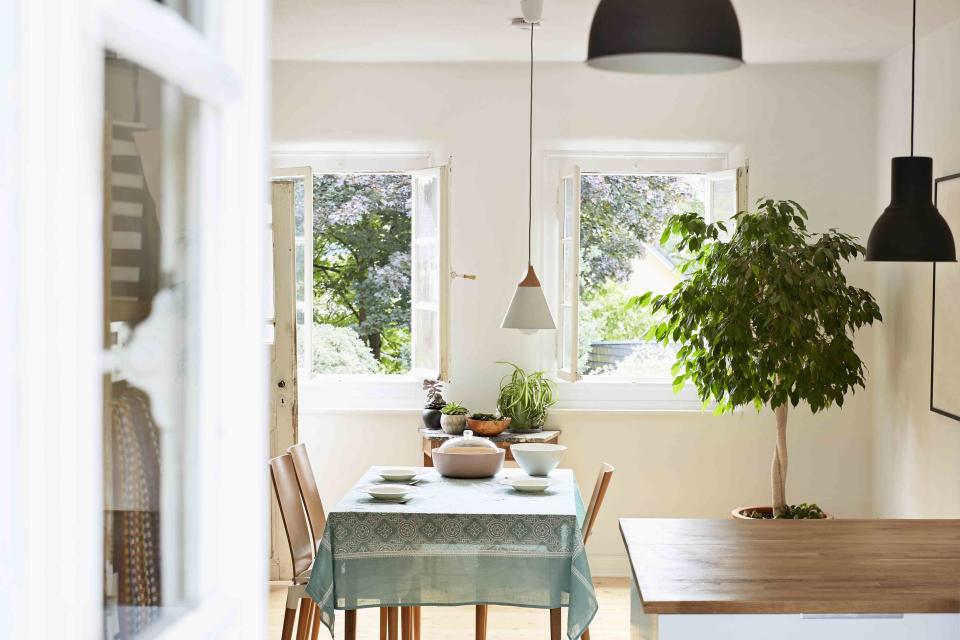5 Common Home Design Choices That Could Be Bad for Your Health
The way you design your home could affect your health more than you think.

Philipp Dimitri/Getty Images
Decorating your home is no easy feat. There is a lot to consider with your home design choices, such as personal preference and how much money you want to spend. But did you know that certain home design choices may actually be bad for your health?
We spoke to experts to learn which home design decisions are the most likely to negatively affect your health and how to avoid making these mistakes.
Allergenic Bedding
Marisa Bettencourt, founder and principal designer at North + Fair Interior Design, explains that understanding the role allergies can play in your home is important when it comes to design choices. One of the big culprits for allergies in your home? The wrong bedding.
“Fluffy down comforters are very on-trend but they can also be a trigger for allergies,” Bettencourt says. “Instead, choose a stylish comforter with a down-alternative stuffing and layer your bed with a chunky woven throw blanket to create a similar look of volume that makes you want to dive right into bed.”
The Wrong Artificial Lighting
Lighting is important when we are looking to set a certain mood but it also helps create a healthy living space. And not every room should be treated the same either.
For living rooms, bedrooms, and offices, Bettencourt says it's best to try the light layering technique. "Choose a warm-toned central pendant light or flush mount, preferably one with a dimmer, and layer in a few accent lights like table lamps and floor lamps," she says.
The right lighting in the home is also important right before you go to sleep, says Mollie Eastman, sleep expert and founder of Sleep Is a Skill. “Transitioning to warmer, dimmable lighting options (no blue light) in the evening can emulate the natural sunset, preparing our body for rest and supporting the release of sleep-inducing hormones.” Yes, the right lighting in your home may actually improve your sleep, and by extension, your health.
Sheer Window Treatments
While light and airy window treatments in the bedroom may look chic, they may allow too much light to enter the room, which could disrupt your sleep.
“Something as simple as allowing too much light into your bedroom at night can disrupt your circadian rhythm which impacts your mood , blood pressure , and even hormones," says Bettencourt. “Instead, choose a heavier light-blocking curtain to help obstruct any outside light and even dampen noises that may impact a restful night's sleep.”
Products That Off-Gas VOCs
Volatile Organic Compounds (VOCs) are gases that emit from many household products and can affect the air quality in your home, therefore affecting your lung health.
“The number one thing I tell my clients when choosing finishes and furnishings is to make sure they are VOC-free,” says Jessica Vegliacich of J Layne Designs and resident of the biophilic community Serenbe. “You would be surprised at how many common products and building materials release VOCs, such as paint, fabrics, composite wood, plastics, and metal finishes.”
Eastman adds it’s important to improve the air quality in your home, which will also help you get a good night's sleep. “Ensuring good ventilation and utilizing air purifiers can mitigate sleep disruptions caused by pollutants or allergens,” she says. “This also extends to addressing mold concerns, VOCs, and more which can markedly impact air quality.”
No Outdoor Living Areas
There are many health benefits to spending time outdoors, such as encouraging us to exercise while also giving our concentration a boost. However, not everyone gets outside enough, especially since so many more of us are now working from home. This is where outdoor living spaces come in handy.
“By creating spaces outside, we’re able to get a little fresh air and enjoy the outdoors,” Vegliacich says.
For more Real Simple news, make sure to sign up for our newsletter!
Read the original article on Real Simple.


